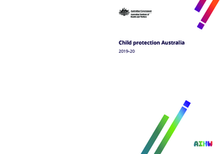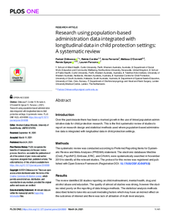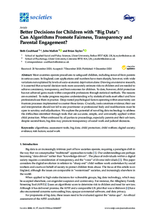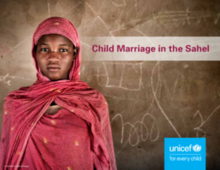Displaying 41 - 50 of 565
Accurate and reliable data on children living in residential care institutions are essential. However, these children are not identified through household surveys and, as a result, are not typically included in official national statistics on key indicators of child well-being. This includes indicators that comprise global monitoring frameworks, such as the Sustainable Development Goals. To help address this data gap, UNICEF has developed the first-ever comprehensive package to collect data on children living in residential care settings. Claudia Cappa, Senior Adviser for Statistics and Monitoring, Data and Analytics Section, DAPM/UNICEF HQ, explains more.
This report presents statistics on state and territory child protection and family support services, and selected characteristics of children receiving these services.
Over the past decade there has been a marked growth in the use of linked population administrative data for child protection research. This is the first systematic review of studies to report on research design and statistical methods used where population-based administrative data is integrated with longitudinal data in child protection settings.
The 32nd edition of the Annie E. Casey Foundation's KIDS COUNT® Data Book describes how children across the United States were faring before — and during — the coronavirus pandemic.
This series of 3 training sessions is based on the newly developed handbook on “Civil Registration, Vital Statistics, Identity Management: Communication for Development targeting CRVS practitioners in LMICs,” which provides guidance on the use of different tools to research, design, implement strategies and measure Social and Behavior Change/ Communication for Development.
This article examines the reasons that child protection has not achieved gains made within comparable professions through statistical methods.
In response to the need for accurate and reliable statistics on children in residential care, UNICEF has developed the first-ever comprehensive methodology to collect data on children living in residential care settings by applying a number of preexisting tools from international survey programmes, such as the Multiple Indicator Cluster Surveys (MICS) and other validated instruments, to an institutional population.
This video is a recording of the virtual launch of the data collection protocol on children in residential care, held by UNICEF on 3 December 2020.
This study, the largest of its kind in Canada, examines when and for whom recurring conditions of neglect were most likely to occur for all children involved with child protection in the province of Quebec over a span of fifteen years.
This brochure from UNICEF provides an overview of child marriage in the Sahel, a region spanning the northern portion of sub-Saharan Africa.





